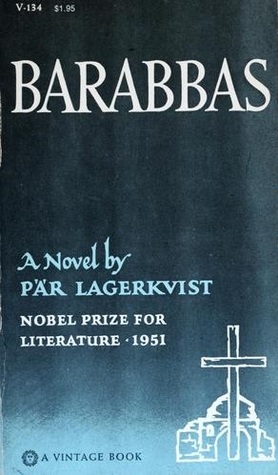He had used his power in the most extraordinary way. Used it by not using it, as it were; allowed others to decide exactly as they liked; refrained from interfering and yet had got his own way all the same: to be crucified instead of Barabbas.
They spoke of his having died for them. That might be. But he really had died for Barabbas, no one could deny it! In actual fact, he was closer to him than they were, closer than anyone else, was bound up with him in quite another way. Although they didn't want to have anything to do with him. He was chosen, one might say, chosen to escape suffering, to be let off. He was the real chosen one, acquitted instead of the son of God himself--at his command, because he wished it. Though they suspected nothing.
In the Gospels, Barabbas is a "notorious prisoner" held by Pilate at the same time as Jesus. Pilate asks the crowd which of the two they would like to see released as part of a Passover rite of pardon, and they choose Barabbas. Par Lagerkvist's novel Barabbas imagines the life of Barabbas after his pardon, traveling up to Golgotha to see the man who is crucified in his stead, hanging around the empty tomb. Barabbas is haunted by Jesus, a man he's never met, but who literalizes one of the core facets of Christianity by dying in his stead.
At first, Barabbas has a kind of didactic fable-like quality to it. The contours of the novel seem pretty apparent: Barabbas, obsessed with this man who is linked to him by sacrifice, learns to become a Christian. Lingering around the nascent Christian community of Jerusalem, he's told that their only ideology is "Love one another," and as hard as it is for the criminal and murderer to understand, it seems to us both simplistic and doctrinaire. But the early Christians are not great at living this creed; they are suspicious of Barabbas, both for his connection to Jesus and his aloofness. Is Barabbas lovable, even by the Son of Man? It seems almost impossible, but such is the mystery of the crucifixion.
The book is best when it leaves Jerusalem, and the immediate context of Jesus' death, behind. It flash forwards several decades: Barabbas, having returned to a life of crime, has been captured and enslaved in the copper mines of the East. He's chained to a fellow criminal named Sahak, a Christian who has Jesus' name scrawled in Greek on the back of the golden medallion that identifies him as a slave. One of the best things about Barabbas is its insistence that Christianity is essentially a slave religion, one that upturns traditional notions of power. "I too have long been thinking of believing in this god," says their Roman overseer when he catches them talking about Jesus, "But how can I? How can I believe anything so strange? And I who am an overseer of slaves, how can I worship a crucified slave?" We, for whom Christianity has been wedded to power for decades, if not centuries, forget that it is a slave religion at heart: disdainful of worldly power, predicated on its abnegation. Jesus paradoxically uses his power "by not using it," as Barabbas notes.
When Sahak explains that the mark on his medallion professes Jesus as his true master, Barabbas has a realization: "Now Barabbas knew that he too was a Christian and that he was God's own slave." But it's not the pat transformation the beginning of the book made me expect. Sahak becomes God's slave of his own free will; Barabbas feels like Jesus' crucifixion in his stead has given him an involuntary claim over him. When the Roman asks if, like Sahak, Barabbas is a Christian, he says no, and he doesn't lie. He is not a believer, he doesn't want to "love one another"; his relationship to God is exactly as voluntary as his relationship to his slavers. Barabbas lingers outside Christianity, drawn to it because of his pardon but never embracing it. He is aloof from everything. Can Jesus redeem such a man, Lagerkvist asks? And if not, how do we make sense of the fact that Barabbas is the first man for whom Jesus sacrificed himself? Is the Barabbas who claims not to be a Christian really the first one?
The novel ends with Barabbas being crucified for another crime. Does this nullify his pardon? Does it suggest that Barabbas, unwilling to accept his reprieve, has God's favor withdrawn from him? At the last he speaks not to God, but to "the darkness" of death, saying, "To thee I deliver up my soul." "Very negative ending," the former owner of my copy wrote in a very polite script. But I'm not so sure. Barabbas reminds me of nothing more than the whiskey priests and lapsed Catholics of Graham Greene, who somehow always find themselves loved and absolved despite their intransigence and apostasy. Barabbas represents something of that central mystery.


No comments:
Post a Comment